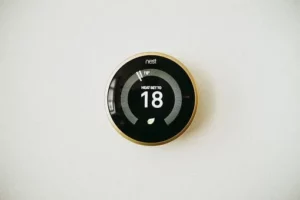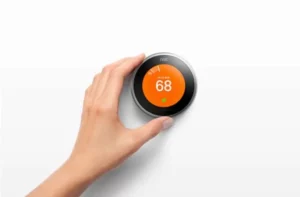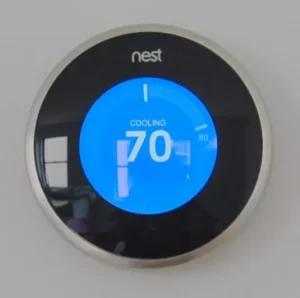In the era of smart homes, Nest thermostats have revolutionized the way we control our indoor climate. These devices offer convenience and energy savings, but what happens when your Nest thermostat shows the wrong temperature? This comprehensive guide delves into the possible reasons behind this issue and provides practical solutions to ensure your home remains comfortable and cozy.
Why Does Nest Thermostat Show Wrong Temperature?
Nest Thermostat displays incorrect temperature readings due to various factors. Understanding these reasons can help you troubleshoot and resolve the issue effectively. Let’s explore the most common causes:

Faulty Sensor Placement
Nest Thermostats rely on accurate sensors to gauge the temperature. Incorrect sensor placement near drafts, direct sunlight, or heat-emitting appliances can lead to skewed readings. Ensure your thermostat is installed in a location that reflects the true temperature of the room.
Calibration Discrepancies
At times, factory calibration might not be perfectly aligned with your home’s HVAC system. This misalignment can cause temperature discrepancies. Recalibrating your thermostat can often rectify this issue and improve accuracy.
Software Glitches
Like any other electronic device, Nest Thermostats can experience software glitches. These glitches might cause temperature inaccuracies. Regularly updating your thermostat’s software and firmware can help prevent and fix such problems.
Delayed Temperature Updates
In some cases, your Nest Thermostat may not update the temperature in real-time, leading to a perceived discrepancy. Patience is key here, as the thermostat’s algorithms work to maintain a consistent and comfortable environment.
Heat/Cool Anticipation
Nest Thermostats employ an advanced feature known as heat/cool anticipation. This anticipates when to turn off heating or cooling to reach the desired temperature accurately. However, incorrect settings or improper usage can cause it to overshoot or undershoot the target temperature.
HVAC System Issues
Sometimes, the problem isn’t with the thermostat itself, but with your heating or cooling system. Malfunctions in your HVAC system, such as dirty filters, malfunctioning fans, or compressor issues, can lead to temperature discrepancies.

Wi-Fi Connectivity Problems
Since Nest Thermostats often rely on Wi-Fi connectivity, network issues can impact their performance. A poor connection might prevent the thermostat from receiving accurate external temperature data, leading to incorrect readings.
User Error
In some cases, user error can contribute to temperature discrepancies. Accidentally setting the wrong temperature or confusing Fahrenheit and Celsius settings can lead to confusion. Double-check your settings to rule out this possibility.
Troubleshooting the Issue:
Resolving the problem of your Nest Thermostat showing the wrong temperature involves a systematic approach. Follow these steps to troubleshoot effectively:
1. Sensor Placement Check
Inspect the placement of your thermostat and ensure it’s away from heat sources, drafts, and direct sunlight.
2. Recalibration
If you suspect a calibration issue, refer to your thermostat’s manual for recalibration instructions.
3. Software Update
Regularly check for software and firmware updates through the Nest app or website.
4. Real-time Updates
Give your thermostat time to update temperatures accurately before making adjustments.
5. Verify Anticipation Settings
Review your thermostat’s anticipation settings and adjust them if necessary.
6. HVAC Maintenance
Schedule regular HVAC system maintenance to rule out system-related temperature discrepancies.
7. Check Wi-Fi Connection
Ensure your thermostat has a stable Wi-Fi connection for accurate external temperature data.
8. Verify Settings
Double-check your thermostat settings to ensure they’re accurate and match your preferences.

FAQs about Nest Thermostat Temperature Accuracy:
Q: My Nest Thermostat suddenly started displaying the wrong temperature. What could be the reason? A: Sudden temperature discrepancies might result from sensor placement, calibration issues, or software glitches. Follow the troubleshooting steps to identify and address the problem.
Q: Can Wi-Fi connectivity affect my Nest Thermostat’s temperature accuracy? A: Yes, poor Wi-Fi connectivity can prevent your thermostat from receiving accurate external temperature data, leading to incorrect readings.
Q: What should I do if my thermostat’s heat/cool anticipation is causing temperature inaccuracies? A: Adjust the anticipation settings through the thermostat’s menu. Experiment with different settings to achieve optimal accuracy.
Q: Are user errors common causes of temperature discrepancies in Nest Thermostats? A: Yes, user errors such as setting the wrong temperature or misunderstanding unit settings can lead to temperature inaccuracies.
Q: Why is it important to maintain my HVAC system for accurate temperature readings? A: A malfunctioning HVAC system can contribute to temperature discrepancies. Regular maintenance ensures your system operates efficiently and accurately.
Q: Can I prevent temperature discrepancies by updating my Nest Thermostat’s software? A: Regular software and firmware updates can address potential glitches and improve temperature accuracy.
Conclusion
A Nest Thermostat displaying the wrong temperature can be frustrating, but it’s a problem with solutions. By understanding the potential causes and following the troubleshooting steps outlined in this guide, you can restore accurate temperature readings to your smart home system. Enjoy the convenience and comfort of your Nest Thermostat with confidence, knowing that you’re equipped to tackle any temperature-related challenges that may arise.
You May Also Enjoy Reading: Can My Nest Thermostat Be Calibrated? (Surprising!)

